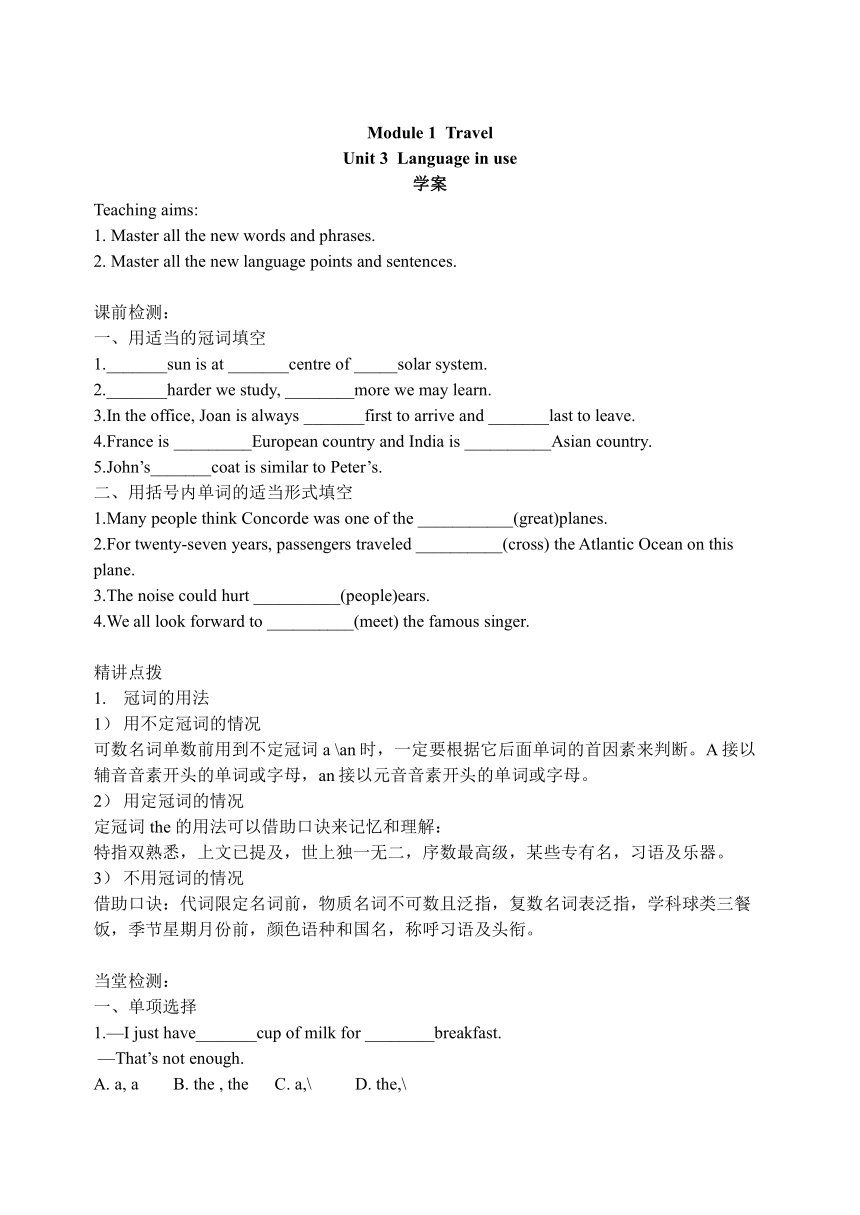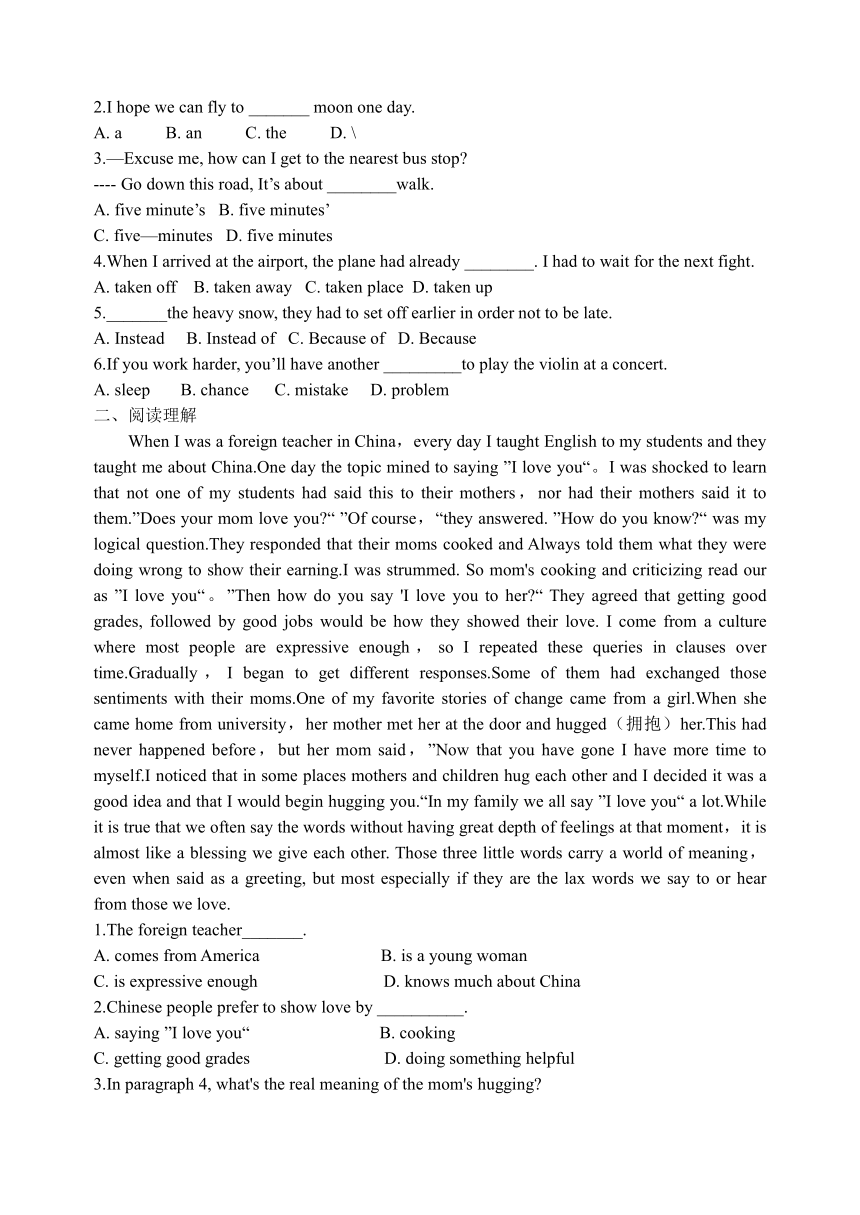外研版九年级下册Module 1 Travel Unit 3学案(无答案)
文档属性
| 名称 | 外研版九年级下册Module 1 Travel Unit 3学案(无答案) |  | |
| 格式 | doc | ||
| 文件大小 | 23.5KB | ||
| 资源类型 | 教案 | ||
| 版本资源 | 外研版 | ||
| 科目 | 英语 | ||
| 更新时间 | 2023-05-04 18:55:53 | ||
图片预览


文档简介
Module 1 Travel
Unit 3 Language in use
学案
Teaching aims:
1. Master all the new words and phrases.
2. Master all the new language points and sentences.
课前检测:
一、用适当的冠词填空
1._______sun is at _______centre of _____solar system.
2._______harder we study, ________more we may learn.
3.In the office, Joan is always _______first to arrive and _______last to leave.
4.France is _________European country and India is __________Asian country.
5.John’s_______coat is similar to Peter’s.
二、用括号内单词的适当形式填空
1.Many people think Concorde was one of the ___________(great)planes.
2.For twenty-seven years, passengers traveled __________(cross) the Atlantic Ocean on this plane.
3.The noise could hurt __________(people)ears.
4.We all look forward to __________(meet) the famous singer.
精讲点拨
1. 冠词的用法
1) 用不定冠词的情况
可数名词单数前用到不定冠词a \an时,一定要根据它后面单词的首因素来判断。A 接以辅音音素开头的单词或字母,an接以元音音素开头的单词或字母。
2) 用定冠词的情况
定冠词the 的用法可以借助口诀来记忆和理解:
特指双熟悉,上文已提及,世上独一无二,序数最高级,某些专有名,习语及乐器。
3) 不用冠词的情况
借助口诀:代词限定名词前,物质名词不可数且泛指,复数名词表泛指,学科球类三餐饭,季节星期月份前,颜色语种和国名,称呼习语及头衔。
当堂检测:
一、单项选择
1.—I just have_______cup of milk for ________breakfast.
—That’s not enough.
A. a, a B. the , the C. a,\ D. the,\
2.I hope we can fly to _______ moon one day.
A. a B. an C. the D. \
3.—Excuse me, how can I get to the nearest bus stop
---- Go down this road, It’s about ________walk.
A. five minute’s B. five minutes’
C. five—minutes D. five minutes
4.When I arrived at the airport, the plane had already ________. I had to wait for the next fight.
A. taken off B. taken away C. taken place D. taken up
5._______the heavy snow, they had to set off earlier in order not to be late.
A. Instead B. Instead of C. Because of D. Because
6.If you work harder, you’ll have another _________to play the violin at a concert.
A. sleep B. chance C. mistake D. problem
二、阅读理解
When I was a foreign teacher in China,every day I taught English to my students and they taught me about China.One day the topic mined to saying ”I love you“。I was shocked to learn that not one of my students had said this to their mothers,nor had their mothers said it to them.”Does your mom love you “ ”Of course,“they answered. ”How do you know “ was my logical question.They responded that their moms cooked and Always told them what they were doing wrong to show their earning.I was strummed. So mom's cooking and criticizing read our as ”I love you“。”Then how do you say 'I love you to her “ They agreed that getting good grades, followed by good jobs would be how they showed their love. I come from a culture where most people are expressive enough,so I repeated these queries in clauses over time.Gradually,I began to get different responses.Some of them had exchanged those sentiments with their moms.One of my favorite stories of change came from a girl.When she came home from university,her mother met her at the door and hugged(拥抱)her.This had never happened before,but her mom said,”Now that you have gone I have more time to myself.I noticed that in some places mothers and children hug each other and I decided it was a good idea and that I would begin hugging you.“In my family we all say ”I love you“ a lot.While it is true that we often say the words without having great depth of feelings at that moment,it is almost like a blessing we give each other. Those three little words carry a world of meaning,even when said as a greeting, but most especially if they are the lax words we say to or hear from those we love.
1.The foreign teacher_______.
A. comes from America B. is a young woman
C. is expressive enough D. knows much about China
2.Chinese people prefer to show love by __________.
A. saying ”I love you“ B. cooking
C. getting good grades D. doing something helpful
3.In paragraph 4, what's the real meaning of the mom's hugging
A. She is meeting her daughter at the dour.
B. She loves her daughter and misses her.
C. She is glad that she has more time to herself.
D. She finds it interesting to hug her daughter.
4.What's the main idea of the passage
A. Say ”I love you“ more to your family.
B. Say ”I love you“ a lot to Chinese people.
C. Say ”I love you“ as a greeting to others.
D. Say ”I love you“ without great depth of feelings.
Unit 3 Language in use
学案
Teaching aims:
1. Master all the new words and phrases.
2. Master all the new language points and sentences.
课前检测:
一、用适当的冠词填空
1._______sun is at _______centre of _____solar system.
2._______harder we study, ________more we may learn.
3.In the office, Joan is always _______first to arrive and _______last to leave.
4.France is _________European country and India is __________Asian country.
5.John’s_______coat is similar to Peter’s.
二、用括号内单词的适当形式填空
1.Many people think Concorde was one of the ___________(great)planes.
2.For twenty-seven years, passengers traveled __________(cross) the Atlantic Ocean on this plane.
3.The noise could hurt __________(people)ears.
4.We all look forward to __________(meet) the famous singer.
精讲点拨
1. 冠词的用法
1) 用不定冠词的情况
可数名词单数前用到不定冠词a \an时,一定要根据它后面单词的首因素来判断。A 接以辅音音素开头的单词或字母,an接以元音音素开头的单词或字母。
2) 用定冠词的情况
定冠词the 的用法可以借助口诀来记忆和理解:
特指双熟悉,上文已提及,世上独一无二,序数最高级,某些专有名,习语及乐器。
3) 不用冠词的情况
借助口诀:代词限定名词前,物质名词不可数且泛指,复数名词表泛指,学科球类三餐饭,季节星期月份前,颜色语种和国名,称呼习语及头衔。
当堂检测:
一、单项选择
1.—I just have_______cup of milk for ________breakfast.
—That’s not enough.
A. a, a B. the , the C. a,\ D. the,\
2.I hope we can fly to _______ moon one day.
A. a B. an C. the D. \
3.—Excuse me, how can I get to the nearest bus stop
---- Go down this road, It’s about ________walk.
A. five minute’s B. five minutes’
C. five—minutes D. five minutes
4.When I arrived at the airport, the plane had already ________. I had to wait for the next fight.
A. taken off B. taken away C. taken place D. taken up
5._______the heavy snow, they had to set off earlier in order not to be late.
A. Instead B. Instead of C. Because of D. Because
6.If you work harder, you’ll have another _________to play the violin at a concert.
A. sleep B. chance C. mistake D. problem
二、阅读理解
When I was a foreign teacher in China,every day I taught English to my students and they taught me about China.One day the topic mined to saying ”I love you“。I was shocked to learn that not one of my students had said this to their mothers,nor had their mothers said it to them.”Does your mom love you “ ”Of course,“they answered. ”How do you know “ was my logical question.They responded that their moms cooked and Always told them what they were doing wrong to show their earning.I was strummed. So mom's cooking and criticizing read our as ”I love you“。”Then how do you say 'I love you to her “ They agreed that getting good grades, followed by good jobs would be how they showed their love. I come from a culture where most people are expressive enough,so I repeated these queries in clauses over time.Gradually,I began to get different responses.Some of them had exchanged those sentiments with their moms.One of my favorite stories of change came from a girl.When she came home from university,her mother met her at the door and hugged(拥抱)her.This had never happened before,but her mom said,”Now that you have gone I have more time to myself.I noticed that in some places mothers and children hug each other and I decided it was a good idea and that I would begin hugging you.“In my family we all say ”I love you“ a lot.While it is true that we often say the words without having great depth of feelings at that moment,it is almost like a blessing we give each other. Those three little words carry a world of meaning,even when said as a greeting, but most especially if they are the lax words we say to or hear from those we love.
1.The foreign teacher_______.
A. comes from America B. is a young woman
C. is expressive enough D. knows much about China
2.Chinese people prefer to show love by __________.
A. saying ”I love you“ B. cooking
C. getting good grades D. doing something helpful
3.In paragraph 4, what's the real meaning of the mom's hugging
A. She is meeting her daughter at the dour.
B. She loves her daughter and misses her.
C. She is glad that she has more time to herself.
D. She finds it interesting to hug her daughter.
4.What's the main idea of the passage
A. Say ”I love you“ more to your family.
B. Say ”I love you“ a lot to Chinese people.
C. Say ”I love you“ as a greeting to others.
D. Say ”I love you“ without great depth of feelings.
同课章节目录
- Module 1 Travel
- Unit 1 We toured the city by bus and by taxi
- Unit 2 It's a long story.
- Unit 3 Language in use
- Module 2 Education
- Unit 1 They don't sit in rows.
- Unit 2 What do I like best about school?
- Unit 3 Language in use
- Module 3 Life now and then
- Unit 1 They sometimes work harder.
- Unit 2 I think life is better today.
- Unit 3 Language in use.
- Module 4 Rules and suggestions
- Unit 1 You must be careful of falling stones.
- Unit 2 we must keep the camp clean.
- Unit 3 Language in use.
- Revison A
- Module 5 Look after yourself
- Unit 1 We'd better get you to hospital.
- Unit 2 Get off the sofa!
- Unit 3 Language in use.
- Module 6 Eating togethe
- Unit 1 When is the school-leavers' party?
- Unit 2 Knives and forks are used for most Western
- Unit 3 Language in use
- Module 7 English for you and me
- Unit 1 Have you ever been to an English corner?
- Unit 2 We all own English.
- Unit 3 Language in use
- Module 8 My future life
- Unit 1 Here's to our friendship and the future
- Unit 2 I know that you will be better at maths.
- Unit 3 Language in use
- Revison B
